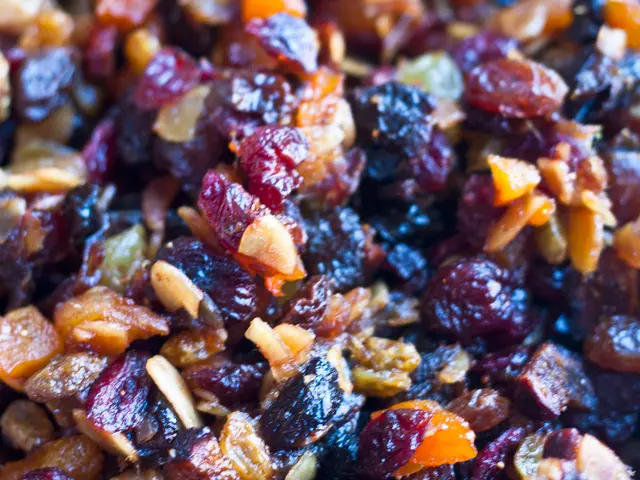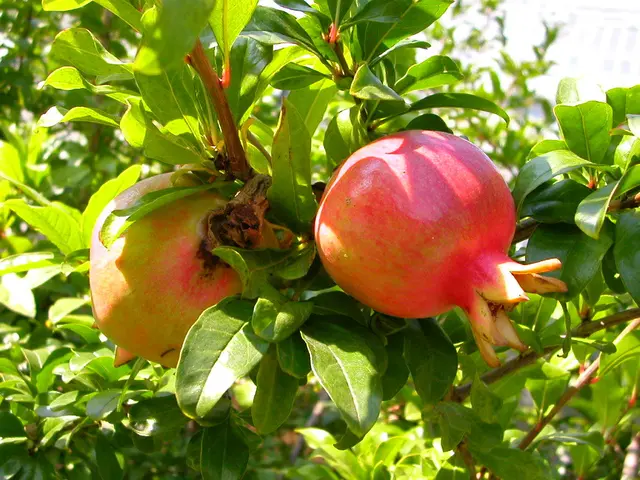Unveiling Allulose: A Low-Calorie Sweetener with Fascinating Properties
Discover the Fascinating Truth About Allulose, a Low-Calorie Sugar Substitute for Satisfying Your Sweet Tooth
Unravel the origins of allulose, a low-calorie sugar, and learn how it's produced through a series of intricate processes. Dive into the science behind its unique molecular structure.
Explore the health benefits it offers, finding its place seamlessly in your balanced diet. Discover tips and recipes for incorporating this sweetener into your everyday life, allowing you to indulge in the sweet allure of allulose guilt-free.
Key Takeaways
- Allulose is a low-calorie monosaccharide found in various foods like jackfruit, figs, raisins, maple syrup, and brown sugar.
- It can be derived from sources such as corn, wheat, figs, and raisins, undergoing purification processes to isolate and refine the substance.
- Allulose boasts a similar molecular structure to fructose but is indigestible to the human body, making it low in calories and not contributing to increased blood sugar levels.
- It has health advantages such as promoting weight loss, proving suitable for people with diabetes, enhancing flavor without excessive sweetness, and being versatile for use in a variety of recipes.
The Origins of Allulose: Uncovering Its Natural Source
Delve into the origins of allulose, a low-calorie sugar substitute.
Known as D-psicose, this monosaccharide occurs naturally in small quantities in certain foods, such as jackfruit, figs, and raisins, as well as in maple syrup and brown sugar.
Allulose doesn't get metabolized by the body in the same way as regular sugar due to its unique chemical structure, making it low in calories and not affecting blood sugar levels.
The benefits of allulose in managing weight are notable.
Since allulose isn't fully absorbed by the body, it has fewer calories compared to other sugars, contributing only 0.2-0.4 calories per gram, compared to regular sugar's 4 calories per gram.
This renders allulose a valuable resource for those seeking to reduce calorie intake and manage their weight. Additionally, studies show that allulose can support fat loss and help reduce body weight when used within a balanced diet.
A Closer Look at Allulose Production: From Raw Material to Sweetener
Discover the intricate process of transforming raw materials into allulose, a popular low-calorie sugar alternative.
Allulose undergoes several essential stages:
- Extraction: Allulose can be derived from various sources like corn, wheat, or fruits like figs and raisins. The raw material goes through series of purification processes to isolate allulose.
- Enzymatic Conversion: Enzymes are used to convert the extracted raw material into allulose. This process involves breaking down the carbohydrates present in the raw material and selectively converting them into allulose.
- Purification: After enzymatic conversion, the allulose is purified to remove any impurities and unwanted substances, ensuring the final product meets required quality standards.
Be mindful of potential side effects when consuming allulose. Some may experience digestive issues like bloating or diarrhea when consuming large amounts. As with any food or sweetener, moderation is crucial.
The Science Behind Allulose: Understanding Its Unique Molecular Structure
Explore the intriguing molecular structure of allulose, which sets it apart from other sugars, contributing to its unique properties.
Allulose is a rare sugar naturally present in small amounts in some foods such as figs and raisins.
What makes allulose unique is its molecular structure, which resembles fructose but differs slightly in the placement of its atoms.
This difference makes allulose indigestible to the human body, as it isn't metabolized in the same way as other sugars. Instead, it passes through the digestive system without contributing calories.
This is why allulose is considered a low-calorie sugar alternative.
Interpreting the metabolism of allulose is essential to grasp its potential side effects. Studies show that allulose is generally well-tolerated by most people, even in high doses.
However, excessive consumption of allulose might cause gastrointestinal discomfort such as bloating or diarrhea in some individuals. It's important to note that these side effects are typically mild and temporary.
The Health Benefits of Allulose: How It Fits Into a Balanced Diet
Discover the health benefits of incorporating allulose into your balanced diet.
Allulose, a low-calorie sugar substitute, offers numerous advantages for those aiming to lose weight or manage diabetes.
Here are three key benefits of using allulose in your diet:
- Weight loss support: Allulose has fewer calories compared to regular sugar, making it an excellent option for individuals looking to reduce their calorie intake and shed pounds.
- Blood sugar management: Allulose doesn't significantly impact blood sugar levels, making it suitable for people with diabetes. Unlike regular sugar, allulose is not fully absorbed by the body, leading to minimal effect on blood glucose levels.
- Flavor enhancement: Allulose enhances the flavor of food and beverages without adding excessive sweetness. It can be used in a wide range of recipes, such as baked goods, beverages, and sauces, without compromising taste.
Incorporating allulose into your diet is a beneficial choice for weight loss and diabetes management. Always consult a healthcare professional or registered dietitian for personalized advice.
Using Allulose in Everyday Life: Tips and Recipes for Incorporating This Low-Calorie Sweetener
Try adding allulose to your morning coffee or smoothie to discover a low-calorie sweetener option.
Allulose is a natural sugar gaining popularity due to its low-calorie content and potential health benefits.
It's a rare sugar naturally occurring in small quantities in certain fruits, like figs and raisins.
One of the reasons allulose is favored as a sweetener is its low calorie count. It contains 0.4 calories per gram, which is significantly less than regular sugar.
In addition to its low-calorie content, allulose has also been found to have minimal impact on blood sugar levels, making it a suitable option for diabetics.
Allulose can be used in various ways, including baking and beverages.
It can be used as a sugar substitute in recipes, providing similar sweetness without the added calories.
When baking, it helps create a moist texture and enhances browning.
When used in beverages, it dissolves easily and adds sweetness without the guilt.
Overall, allulose is a versatile and low-calorie sweetener option that can complement your everyday life.
Whether you're looking to reduce your calorie intake or manage your blood sugar levels, allulose is a great addition to your favorite recipes and beverages.
Frequently Asked Questions
Is Allulose Safe for Consumption?
Allulose is safe for consumption and can aid in weight loss efforts.
It is a low-calorie sugar alternative that can be used in various foods and beverages as a sugar substitute.
Additionally, allulose is suitable for people with diabetes, as it does not raise blood sugar levels.
Incorporating allulose into your diet can help you achieve weight loss goals more effectively and manage your diabetes.
Can Allulose Be Used as a Sugar Substitute in Baking?
Yes, allulose can be used as a sugar substitute in baking.
The unique properties of allulose make it an excellent choice for baked goods.
Not only does it provide sweetness without the added calories, but it also offers benefits for individuals with diabetes, as it does not raise blood sugar levels.
Get ready to enjoy delicious treats without guilt!
Does Allulose Have Any Impact on Blood Sugar Levels?
Allulose does not have a significant impact on blood sugar levels, making it suitable for people looking to manage their blood sugar levels.
Research also suggests that allulose may have potential benefits for weight loss and gut health.
Consult a healthcare professional for personalized advice.
How Does Allulose Compare to Other Low-Calorie Sweeteners in Terms of Taste?
Allulose stands out among other low-calorie sweeteners in terms of taste.
It has a similar sweetness to sugar without the guilt-inducing calories.
In fact, studies show that allulose is roughly 70% as sweet as sugar, meaning you can enjoy the same level of sweetness with fewer calories.
Not only does allulose satisfy your sweet tooth but also comes with health benefits.
It does not raise your blood sugar levels and has no impact on insulin production.
Are There Any Known Side Effects or Potential Risks Associated With Consuming Allulose?
Moderation is key when consuming allulose. Some individuals might experience digestive issues such as bloating or diarrhea when consuming large amounts.
Further research is needed to fully understand the long-term effects of allulose consumption. As always, consult a healthcare professional before making significant changes to your diet.
Conclusion
In conclusion, allulose is a natural, low-calorie sugar alternative that offers numerous health benefits.
Embrace its origins in nature and discover the potential to elevate your everyday life by incorporating allulose into your balanced diet.
While enjoying the taste of your favorite treats, the allure of allulose promises guilt-free indulgence.
- The origins of allulose are found in various foods like jackfruit, figs, raisins, maple syrup, and brown sugar as well as derivatives from sources like corn, wheat, figs, and raisins.
- Allulose boasts a unique molecular structure that resembles fructose, making it indigestible to the human body, thus low in calories and not contributing to increased blood sugar levels.
- Allulose has health advantages such as promoting weight loss, proving suitable for people with diabetes, enhancing flavor without excessive sweetness, and being versatile for use in a variety of recipes.
- It's essential to understand the extraction and purification processes, including enzymatic conversion of raw materials into allulose and the subsequent purification to ensure quality.
- The science behind allulose explains its low calorie count, minimal impact on blood sugar levels, and its potential side effects such as gastrointestinal discomfort when consumed in large amounts.
- Using allulose in everyday life provides nutritional benefits, especially for weight loss and blood sugar management, which can be achieved by incorporating it into favorite recipes and beverages while following a balanced diet.








